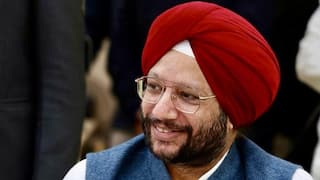Electoral Bonds Scheme Violates RTI, To Be Struck Down As Unconstitutional, Says Supreme Court
The Supreme Court arrived at a unanimous decision that the Electoral Bond Scheme is unconstitutional and violates Article 19 (1) (a) of Indian Constitution.

The five-judge Constitution Bench on Thursday arrived at a unanimous decision that the Electoral Bond Scheme is unconstitutional and violates Article 19 (1) (a) of Indian Constitution. The court gave two opinions, one by Chief Justice Of India DY Chandrachud and another by Justice Sanjiv Khanna. However, both arrived at the same conclusions.
In 2018, Centre brought in the Electoral Bond scheme by amending four Acts-- Representation of the People Act, 1951, (RPA), the Companies Act, 2013, the Income Tax Act, 1961, and the Foreign Contributions Regulation Act, 2010 (FCRA). The court today struck down these amendments as unconstitutional.
Before the scheme was implemented the political parties were required to declare all donations above Rs 20,000. There was also a check on corporate donations as companies were not allowed to make donations amounting to more than 7.5% of profit. However, the Electoral Bonds scheme removed the 7.5% limit on corporations and allowed loss-making companies to donate as well.
While reading the verdict the CJI said that the petitioners had raised two primary issues-- Firstly, whether amendments are violative of right to information under Article 19(1)(a). And secondly, if unlimited corporate funding violates principles of free and fair elections.
On these contentions the Supreme Court held that the anonymous electoral bonds are violative of right to information under Article 19(1)(a) of the Indian Constitution.
The court further held that the financial support to political parties can lead to quid pro quo arrangements. The petitioners had contended that corporates could use the Electoral Bond scheme for backdoor lobbying to get a favourable policy from the ruling party.
ALSO READ | Supreme Court Asks Political Parties To Return Uncashed Electoral Bonds To Purchasers
On Centre's contention that the electoral bond scheme was brought in to curb black money in the system, the apex court held that the electoral bonds scheme is not the only scheme to curb black money. There are other alternatives as well. The CJI said that the infringement of the right to information is not justified by the purpose of curbing black money.
While dictating order the CJI, said that financial contributions to political parties could be made for two reasons-- for support to political parties, or the said contribution may be a way of quid pro quo. He noted that the amendments made to Section 182 Companies Act is manifestly arbitrary for treating companies and individuals alike.
"A company has more influence on the political process than contributions by individuals. Contributions by companies are purely business transactions. Amendment to Section 182 Companies Act is manifestly arbitrary for treating companies and individuals alike."
The petitioners had also challenged the amendment that allowed loss making companies to contribute to the Electoral Bonds Scheme. They had contended that it opens doors for shell companies.
The CJI while dictating the verdict said that the amendment does not recognise the harm of allowing loss-making companies to contribute due to quid pro quo.
"The amendment to Section 182 Companies Act is manifestly arbitrary for not making distinction between loss making and profit making companies," the CJI said.
The top court issued directions to the State Bank Of India (SBI ) to stop issuing Electoral Bonds immediately and submit all details to the Election Commission of India (ECI) by March 6.
The court has also directed the ECI to make all donations public within one week of the receipt of the information and publish the information on its website by March 13.
"The State Bank of India shall furnish the details of donations through electoral bonds and the details of the political parties which received the contributions...SBI shall furnish the details of electoral bonds encashed by the political parties," the CJI said.
The court has also said that the Electoral Bonds currently under the 15-day validity period should be returned by political parties to the purchasers.
Related Video
Uttarakhand News: Winter Chill Grips North India; Kedarnath Dham Covered in Snow





































